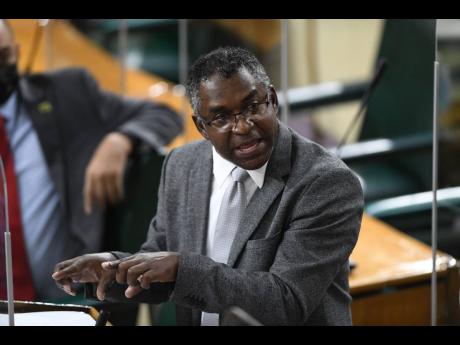NWC workers’ grievance has 13-year history!
Public sector reclassification raises ghost of incomplete 2010 exercise
THE FAILURE by the National Water Commission (NWC) to implement the recommendations of a reclassification exercise done in 2010 is at the heart of the discontent between workers and management. This led to last week’s threat of industrial action by...
THE FAILURE by the National Water Commission (NWC) to implement the recommendations of a reclassification exercise done in 2010 is at the heart of the discontent between workers and management. This led to last week's threat of industrial action by its more than 2,000 employees, The Gleaner has been reliably informed.
The Gleaner was told that the employees have good reasons for their threat and it is rooted in a 13-year quarrel with the NWC.
A former employee of the company told The Gleaner late yesterday that at the heart of the discontent was an “unexplained shelved reclassification exercise dating back to 2010” with workers and the NWC's management.
According to her, the current workers feared that reclassification efforts would once again be shelved, as Government's current public sector reclassification exercise is under way and coming close to a conclusion – with many groups reclassified and compensated – while very little or no progress has been made with them.
RENEWED TENSION
“There is a long outstanding agreement that goes back to 2010 about having this reclassification and job evaluation exercise and it was shelved. When the compensation review in the public sector came about, it would have generated interest and renewed tension, and raised the ghost of the shelved reclassification effort,” the former employee told The Gleaner.
“And so the parties went to Ministry of Labour and Social Security and so there was an agreement after the strike action two years ago for PricewaterhouseCoopers (PWC) to conduct such an exercise. But it was moved to the current time, as you could not go to so many years of retroactive payments and reclassification,” she told The Gleaner.
“So it was current job, current pay scale, current market,” said the former employee.
PWC's findings would have been handed to the Finance Ministry and concerns, queries, recommendations and workers' expectations would have to be ongoing, according to the source. The public sector exercise was done by Ernst and Young, and alignments would have to be made in keeping with the Government's structure.
Tensions were especially heightened, she said, especially among workers in the lower bands at NWC who received salary advances. As it appeared, some could end up owing NWC.
“Some workers in the lower bands who received salary advances without the conclusion of the exercise found themselves in a situation where they owed the NWC. So the vexation came about because the people said, 'look, we asking for this for a long time'.
The public sector exercise created anticipation and expectation of retroactive payment going back to 2010 …” said the former highly placed employee.
HEIGHTENED EXPECTATION
Continuing she said: “That was not going to happen. And when the finance minister said the public sector wage negotiations should be concluded by March, then that created heightened expectation and more tension given what was happening in the public sector and their exercise which was not concluded.”
The Bustamante Industrial Trade Union (BITU) is one of five unions representing workers at the State-owned, operated facility. Its president general, Senator Kavan Gayle, said he has some recollections of the shelved exercise, but could not speak to the situation that would have led to the current discontent.
“The BITU's understanding of the issue in terms of where it's coming from and where it is now, I believe frustration from a lack of communication may have led to the current situation. But the fact that the parties are at the table treating with the matter is progress,” Gayle told The Gleaner.
“The issue that must be ventilated though is that conducting an exercise of this nature is not an easy one. On the one hand is managed expectation, and on the other hand is to arrive at the most desirable results,” he explained.
He said the current situation should make clear and take into consideration that what cannot be fixed now, and there are processes for appeals to continue the dialogue.
He said the need for communication was of critical value.
The National Workers Union (NWU) is another union representing the workers.
Its president, Granville Valentine, told The Gleaner that the workers were vexed, but would not take any adverse actions until current discussions are complete.
The more than 2,000 NWC workers are represented by the Jamaica Association of Local Government Officers, BITU, NWU, the Union of Public and Private Employee, and the NWC Executive Staff Association.
Last year's strike action is reported to have cost the NWC $240 million.
Workers went on strike for two days then, crippling business and public service activities.


